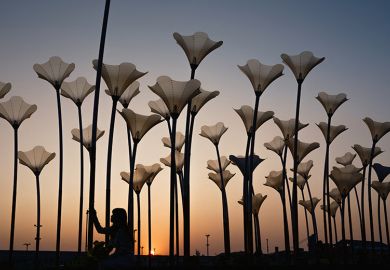Browse the THE Young University Rankings 2019 results
Australia has confirmed its status as the upstart of global higher education, boasting more entries than any other nation in the top echelons of Times Higher Education’s Young University Rankings.
Fifteen Australian institutions have made the top 100 in this year’s list of the world’s best universities founded during the past half-century. Only France comes near matching this feat, with 14 entries in the top 100.
But France’s leading lights include recently merged entities such as Paris Sciences et Lettres – PSL Research University Paris, Sorbonne University and Grenoble Alpes University, formed from prestigious antecedents established as early as 1150. By contrast, many of Australia’s top young universities and their forerunners were founded in the late 20th century.
Melbourne-based Victoria University, which has climbed eight places from last year to notch 43rd place in the 2019 rankings, said that the result validated its “new way to do uni” ethos. Senior deputy vice-chancellor Marcia Devlin said that VU’s efforts to “reconceptualise tertiary education” were encapsulated in a cross-disciplinary research model – crafted to benefit the university’s Western Suburbs backyard – and the adoption of Sweden’s block mode of teaching.
The Young University Rankings are a subset of THE’s flagship World University Rankings, calculated using similar methodology. But the weightings are recalibrated to reflect young universities’ missions, with less emphasis on reputational surveys and more on factors such as research productivity, staff-student ratios, institutional income and doctoral education.
This year’s list includes 22 universities in Australia, behind France’s 24 and the UK’s 34. But the UK’s top-rated young university, Brighton and Sussex Medical School, ranks behind Australia’s seven best-placed institutions while half of Britain’s entries rank behind Australia’s lowliest performer.
The University of Technology Sydney again tops the list of Australian entries, climbing three places to 13th. It is followed by Queensland University of Technology (24th this year) and the University of South Australia (26th).
The University of Wollongong has leapfrogged James Cook University to round out Australia’s top five at 29th and 33th respectively.
Ten Australian universities improved on last year’s results, with eight losing ground and four unchanged. The biggest improver was the University of Canberra, which climbed 24 places to 34th.
Vice-chancellor Deep Saini said that UC’s 2018-22 strategic plan included an aspiration to be among the world’s top 50 young universities. “It is fantastic to reach this goal three years ahead of schedule,” he said.
UC improved on most measures, particularly knowledge transfer, research and citations. Deputy vice-chancellor Leigh Sullivan said that the university had focused its research investment in areas of relevance to the Canberra region.
These disciplines included governance, environment, education, genetics, sports science and public and clinical health. “Extensive” coverage in journals such as Science, Nature and The Lancet had contributed to the university’s research profile, he said.
Another improver, the Australian Catholic University, has broken into the top 100 after placing in the 100-150 band last year. Acting vice-chancellor Stephen Weller credited the “skill of ACU teachers and researchers”.
“Our university has grown substantially since our establishment in 1991,” he said.
Overall, Hong Kong University of Science and Technology (HKUST) has topped the ranking for the second year running. It is followed by Switzerland’s École Polytechnique Fédérale de Lausanne and Singapore’s Nanyang Technological University.
Hong Kong’s City University and Polytechnic University also performed admirably at fifth and 15th respectively.
Register to continue
Why register?
- Registration is free and only takes a moment
- Once registered, you can read 3 articles a month
- Sign up for our newsletter
Subscribe
Or subscribe for unlimited access to:
- Unlimited access to news, views, insights & reviews
- Digital editions
- Digital access to THE’s university and college rankings analysis
Already registered or a current subscriber?









